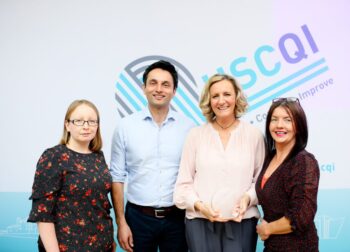26 March 2020

Quality Improvement Awards 2019 Winners
The winners of the HSC Quality Improvement Awards 2019 (previously the Safety Forum Awards) awards were revealed at a celebration event in Riddell Hall, Queen’s University earlier this month. These annual awards celebrate and recognise the innovative and excellent QI work going on across health and social care in the region.
Speaking at the awards celebration, Mark Vignesha Roberts MPH FRCP, Clinical Director, Improvement Hub for HSCQI commented:
‘These prestigious awards showcase the significant, often ground breaking work in Quality Improvement that is going on in all professional disciplines in acute, social and primary care. It is a great opportunity for teams and individuals to share their innovations and projects and for us all to continue to learn from each other.’
In addition to five individual categories, the overall HSC Quality Improvement Award was awarded to the individual/team category winner that has made the greatest contribution to quality improvement and safety in Health and Social Care.
The Building Reliable Care Award was won by Kathy McBride and her team from the Western Health and Social Care Trust for their imaginative project to improve the discharge process for hospitalised children in Altnagelvin Area Hospital. Staff in the hospital working within the Children’s Unit carried out the QI Project with the aim of improving the current discharge process for hospitalised children and their carer’s. 40% of Ward 6 (Paediatrics) patients requiring medication following the decision of discharge were to be discharged home within 4 hours by June 2019. The project achieved more timely discharges, improved patient flow and staff and service user satisfaction.
The Innovation/Transformation in Care Award was won by the ‘Bronchiolitis … When less is more’ project developed by Joanne McClune from the South Eastern Health and Social Care Trust. A multi-professional team from the Paediatric Unit and unscheduled care undertook the QI project to implement NICE guidance; Bronchiolitis in children: Diagnosis and management. The project involves medical and nursing staff in 3 areas in the Ulster Hospital- Emergency Department, Paediatric Rapid Response and Maynard Sinclair Ward. NICE guidance includes recommendations on diagnosis, treatment and management, admission and discharge criteria. This involved considerable change to medical and nursing practice, a shift in culture and traditional ways of caring for children with bronchiolitis. Traditional clinical interventions e.g. routine suction, bloods, x-rays, bronchodilators and other medications are no longer advised with a lower threshold for oxygen administration and are was focussed on supportive with minimal interventions.
The Partnership/Co-production Award went to Samantha Jennings and her team from the Belfast Health and Social Care Trust for the Shared Haemodialysis Care project. ShareHD is an initiative, supported by the Health Foundation, to encourage patient participation in hospital-based haemodialysis (HD) treatment. HD involves attending hospital 3 times per week for 4 hour treatments. Patients are also required to restrict dietary and fluid intake, take multiple medications, and face a poor prognosis (50% five year survival). Unsurprisingly, patients can be non-adherent with treatment and feel they have lost control. Patient participation in management of chronic illness is associated with physical and psychological improvements. Belfast City Hospital successfully applied to join Phase 3 of ShareHD. One of th patients who helped shape the service Robin shared his personal story of dialysis at the awards ceremony explaining how taking part in shared care has given him some control, a feeling of self esteem and achievement and a better understanding of his care, powerful words for a life changing project.
This year for the first time there was a Primary Care category and the winner was Aoibhin McGarrity’s Crystal Clear project. It aimed to improve gout treatment so that 75% of patients with gout would have their preventative medication titrated appropriately to achieve a serum urate of < 300. Gout is the most prevalent inflammatory arthritis, affecting 2.5% of adults in the UK. Improving treatment leads to less pain and joint destruction which preserves function and limits time off work. The results demonstrated that now 80% of patients with gout are on a preventer titrated appropriately as per guidance.
The winner of the HSCQI Overall Award and winner of the Integrating Care Across Boundaries Award went to Joanne Smylie and her NIAS team whose Frequent Callers Project demonstrated multiagency working to achieve positive outcomes for frequent callers. Frequent callers are those who call 5 times in a month or 12 times in 3 months. NIAS responds daily to individuals with complex needs, often non clinical and not within its area of expertise to manage. Crews are left with the choice of bringing the person to ED or leaving them at home when they often call 999 again as their issue has not been resolved. Due the demand this put on the 999 system and the fact that these service users had needs which were not being adequately addressed, a small team was seconded to support these patients. The team began to pilot holistic assessment of the patient and identify the root cause of their issues. Through information sharing and collaborative working with experts from Trusts, their GP and other agencies including the community and voluntary sector they try to help manage their often complex needs. This project piloted different case management approaches which demonstrated significant positive outcomes. This project rose to the significant challenges of multiagency working and resulted in extremely positive feedback from families and individuals who truly appreciated the holistic approach.
Each of the 5 Category winners were awarded £800, with the overall winner receiving a prize of £1,600, to be put towards expenses linked with advancing the Teams’ improvement goals.



